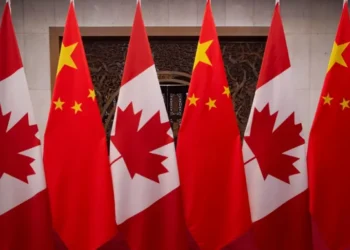Chinese President, Xi Jinping has urged top European Union officials to “properly handle differences and frictions” as he criticised Brussels’s recent trade actions against Beijing at a summit dominated by concerns on trade and the Ukraine war.
Xi told European Commission President, Ursula von der Leyen and European Council President, Antonio Costa at the 25th EU-China Summit, which comes at a particularly rocky time in their relationship, that the current challenges “facing Europe do not come from China.”
Xi urged the EU to “adhere to open cooperation and properly handle differences and frictions.”
“Improving competitiveness cannot rely on building walls and fortresses. Decoupling and breaking chains will only result in isolation.
“It is hoped that the European side will keep the trade and investment market open and refrain from using restrictive economic and trade tools.”
Xi Jinping
In a further veiled criticism of Brussels’ recent hawkish stance on China, Xi also warned EU leaders to “make correct strategic choices” in the face of recent global challenges.
EU and China are marking 50 years of diplomatic relations amid thorny disagreements ranging from the EU-China trade deficit to Beijing’s ongoing support for Russia’s war in Ukraine.
The event is the first in-person summit for Chinese and EU leaders since 2023, and more modest than initial plans for a two-day meeting in Europe.
During the meeting in Beijing’s Great Hall of the People, von der Leyen focused on trade disagreements and told Xi that as “cooperation has deepened, so have imbalances.”

She added that an inflection point has been reached, urging China to “come forward with real solutions.”
She was referring to the EU’s trade deficit with China, which ballooned to a historic 305.8 billion euros ($360bn) last year.
EU trade actions in the past year have targeted Chinese exports of electric vehicles (EVs), among other goods, and its officials have repeatedly complained about Chinese industrial overcapacity.
Chinese state media and officials have billed the EU-China summit as a chance for Beijing and the EU to normalise relations at a time of global uncertainty, stirred by United States President Donald Trump and others.
The EU is likely to seal a trade deal with the US for a broad tariff of 15 percent on its exports after intense negotiations, avoiding a harsher 30 percent figure threatened by Trump.
China and the US are also negotiating trade after the two sides agreed to slash tit-for-tat heavy tariffs for 90 days in May. That suspension expires on August 12.
In June, the US said it would impose 55 percent tariffs on Chinese goods, down from the 145 percent Trump had imposed in April. In return, Beijing said, it will impose a 10 percent tariff on goods it imports from the US, down from 125 percent.
Xi Urged To Use Influence To Help End Russia-Ukraine War

A key source of friction is Russia’s war in Ukraine. Brussels says China’s deepening political and economic relations with Russia since the 2022 invasion represent tacit support for Moscow that has helped its economy weather sweeping Western sanctions.
Meeting Xi, Costa urged China to “use its influence” to help end Russia’s “war of aggression.”
Last week, the bloc adopted a new package of sanctions on Russia – including on two Chinese banks, leading Beijing’s Commerce Minister to issue “solemn representations” to his EU counterpart.
While expectations for any concrete deals were low heading into the summit, Brussels and Beijing signed an agreement on climate change and carbon emissions.
According to the joint statement, China and the EU have agreed to uphold the goals of Paris agreement and enhance “bilateral cooperation” in areas such as energy transition, adaptation, methane emissions management and control, carbon markets and green and low-carbon technologies.
READ MORE: TOR, BOST Sign Strategic MoU to Revive Downstream Petroleum Sector























